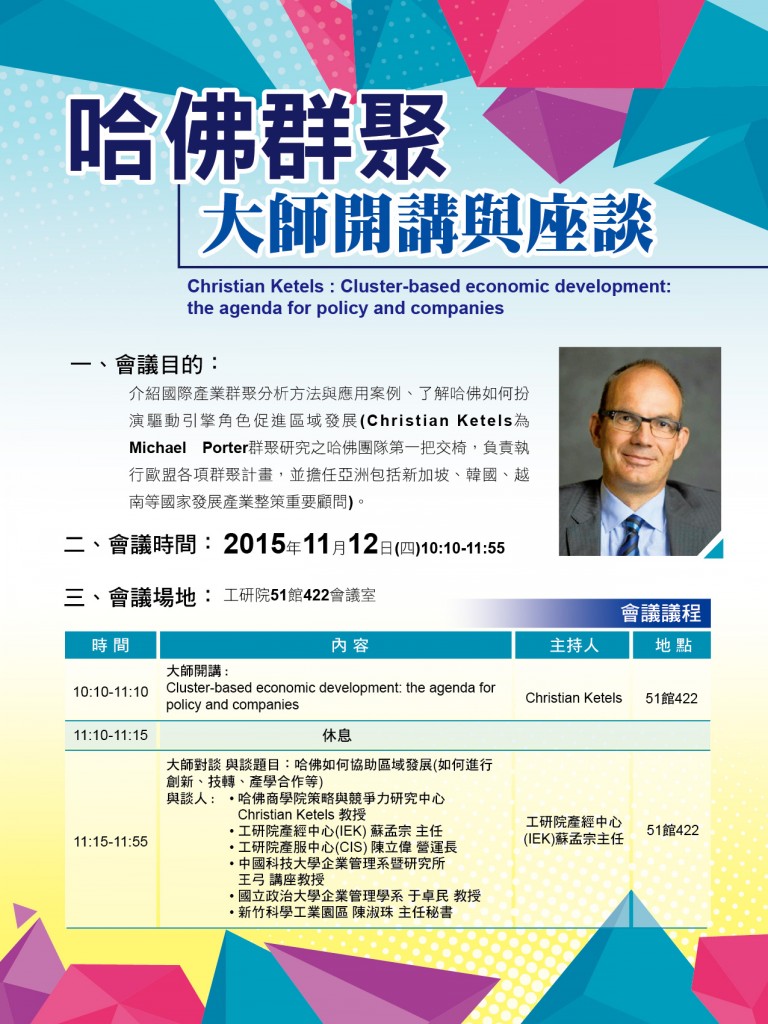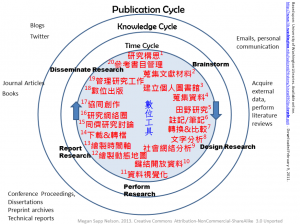
Archives
2015/11/12
哈佛群聚大師開講與座談 Dr. Ketels : Cluster-based economic development: the agenda for Policy Research Institute
一、會議目的:
介紹國際產業群聚分析方法與應用案例、了解哈佛如何扮演驅動引擎角色促進區域發展( Christian Ketels為哈佛商學院Michael Porter群聚研究團隊第一把交椅,負責執行歐盟各項群聚計畫,並擔任亞洲包括新加坡、韓國、越南等國家產業發展政策擬定及國家競爭力提升之重要顧問) 。
二、會議時間:2015年11月12日(四)10:10-11:55
三、會議場地:工研院51館422會議室
四、會議議程:
| 時間 | 內容 | 主持人 | 地點 |
| 10:10-11:10 | 大師開講 :Cluster-based economic development: the agenda for policy and companies | Christian Ketels | 51館422 |
| 11:10-11:15 | 休息 | — | — |
| 11:15-11:55 | 大師對談 :與談題目 :哈佛如何協助區域發展(如何進行創新、技轉、產學合作等)與談人 :• 哈佛商學院策略與競爭力研究中心Christian Ketels 教授• 工研院產經中心(IEK)蘇孟宗 主任• 工研院產服中心(CIS)陳立偉 營運長• 中國科技大學企業管理系暨研究所
王弓 講座教授 • 國立政治大學企業管理學系 于卓民 教授 • 新竹科學工業園區 陳淑珠 主任秘書 |
工研院產經中心(IEK)蘇孟宗主任 | 51館422 |
※若因不可抗力因素,主辦單位保留變更議程及講師之權利
報名網址:
https://college.itri.org.tw/SeminarView.aspx?no=20150019&msgno=314524
2015/11/11

Dr. Ketels from the Harvard Business School
presents
Understanding Clusters: A Look at New Research
哈佛大師開講: 了解最新的群聚研究
11th November 2015
7 – 9 pm
1st floor of College of Commerce,National Chengchi University
國立政治大學商院國際會議廳
Dr. Ketels will share his research on clusters and
driving cluster-based economic development
Ketels教授分享產業群聚發展地圖的建立與
哈佛商學院最新課程: 個體經濟的競爭力
Dr. Ketels is a faculty member at Harvard Business School since 2000, where he serves as the Principal Associate of the Institute for Strategy and Competitiveness. He is a Senior Research Fellow at the Stockholm School of Economics and Honorary Professor at the European Business School, Germany. He advises international organizations, national and regional governments, and industry-led groups.
In the past 15 years, he has led more than twenty major competitiveness efforts in countries and regions around the globe. He played a central role in the major cluster mapping efforts underway in the US (Department of Commerce) and the EU (DG Growth) since 2006. Dr. Ketels serves as the President of the TCI Network, which is connecting globally leading organizations and professionals in cluster-based economic development.
He offers courses on “Microeconomics of Competitiveness” at the Harvard Business School and several other universities and authored more than 25 journal articles and more than 20 book chapters. Dr. Ketels is co-editor of the Competitiveness Review, an academic journal devoted to research on locational competitiveness and clusters.
This forum is organized by the College of Commerce and co-hosted by ApSTi (Asia-Pacific SpatioTemporal Institute) National Chengchi University. This event is sponsored by the Industrial Technology Research Institute (工研院).
2015/11/12
ApSTi Round Table with Dr. Ketels
Topic: It’s All About Mapping in Digital Humanities
Date: November 10th, 2015
Time: 14:00 – 17:00
Place: 350316, Research & Innovation-Incubation Center, National Chechchi University, Taipei
Format: Presentations and Roundtable Discussion
Featuring: Christian Ketels
Participating Discussants: David Blundell, Andy Jan, Ching-chih Lin, Daya (Da-wei) Kuan, Hsiung-ming Liao
ApSTi Website: http://apsti.nccu.edu.tw/
Featured Participant:
Christian Ketels, a member of the Harvard Business School faculty at Professor Michael E. Porter’s Institute for Strategy and Competitiveness. He holds a Ph.D. (Econ) from the London School of Economics and further degrees from the Kiel Institute for World Economics and Cologne University. He is President of TCI, a global network of professionals in the field of competitiveness, clusters, and innovation, Honorary Professor at the European Business School Oestrich-Winckel, and Senior Research Fellow at the Stockholm School of Economics. In 2009 he served as a Visiting Professor at the Lee Kuan Yew School of Public Policy, Singapore. Dr Ketels has led cluster and competitiveness projects in many parts of the world, has written widely on economic policy issues, and is a frequent speaker on competitiveness and strategy in Europe, North America, and Asia.
Participating Discussants:
David Blundell, doctorate in Anthropology from the University of California based on the life histories of Buddhist practitioners making their own ethnographic films in Sri Lanka. Prof Blundell is Director of the Asia-Pacific SpatioTemporal Institute (ApSTi), Top University Project in Digital Humanities, Research & Innovation-Incubation Center, National Chengchi University, Taipei. His publications concern belief systems, visual anthropology, aesthetic anthropology, Austronesia, language and culture, geographic information systems (GIS) mapping, Asia-Pacific as a cultural area.
Andy Jan, geo-spatial software engineer who is also specializing in forestry resource management, geographic information systems. Currently Associate Professor in the Department of Land Economics, and Co-Director of the Asia-Pacific SpatioTemporal Institute (ApSTi), Top University Project in Digital Humanities, Research & Innovation-Incubation Center, National Chengchi University, Taipei. Dr Jan has established digital systems to analyze global environments, and has developed Volunteered Geographic Information (VGI) as strategies for local community data collection.
Ching-chih Lin, Ph.D. in History at UC Berkeley, is Assistant Professor in the Graduate Institute of Religious Studies, and Secretary of Asia-Pacific SpatioTemporal Institute (ApSTi), Top University Project in Digital Humanities, Research & Innovation-Incubation Center, National Chengchi University, Taipei. His research interests include Chinese popular religion, historical anthropology, oral history, cultural and environmental history, and digital humanities. He recently utilizes several research tools and methods of digital humanities (i.e., GIS and social network analysis) in the study of Chinese popular religion in China and Taiwan. Prof Lin is also constructing a GIS platform for the study of Chinese woodblock prints (muban nianhua 木版年畫).
Daya (Da-wei) Kuan, Associate Professor of the Department of Ethnology, National Chengchi University. He holds a Ph.D. in Geography from University of Hawaii at Manoa. He is a research member of ApSTi with interests including development geography, cultural geography, and indigenous geography.
Hsiung-ming Liao, Assistant Research Scientist of the Center for GIS, Research Center for Humanities and Social Sciences, Academia Sinica, Taipei. He is a research member of ApSTi with interests including cartography, GIS, remote sensing, GPS, digital archives, and digital humanities.
ApSTi Orientation: Geographic information and timelines provide an effective integrating and contextualizing function for cultural attributes. As cross walks for information from multiple sources and in multiple formats they create visual indexes for diverse cultural data. Spatiotemporal interfaces provide new methods of integrating primary source materials into web-based interactive and 3D visualizations. We are able to chart the extent of specific traits of cultural information via maps using GIS gazetteer style spreadsheets for collecting and curating datasets. The system is based on GIS point locations, routes, and regions linked to enriched attribute information. These are charted and visualized in dynamic maps and can be analyzed with network analysis, creating an innovative digital infrastructure for scholarly collaboration and creation of customizable visualizations. This method gives the researchers an expanse of data in layers of time across space providing new tools to advance humanistic inquiry. This in turn becomes a Web-based bulletin board for local community and scholarly knowledge exchange.
Group projects are linked together for the synergies of mutual concerns in regional Spatial Humanities. These include:
Religious Networks
Historical Migrations
Recognition of Signs, Symbols, and Motifs
Use of Old Maps
Historical Spatiotemporal Indexing of Sites
Comparing Physical Artifacts
Multilingual and Historical Textual Information
Genealogies
Attributes and Features Analysis
Cluster Mapping Techniques
2015/11/06
【數位人文演講】
講題:初探人文學的數位研究工具:類型與案例
講者:陳淑君博士(中央研究院台灣史研究所助研究員、數位文化中心執行秘書)
時間:2015年11月6日(五)下午 1:10-3:00 演講 3:00-4:00 自由討論
地點:政治大學行政大樓七樓第五會議室
如何運用數位研究工具,推動人文與社會科學研究,完成學術論文或專書?
本次演講特邀陳淑君教授,依據知識、出版與時間的三重循環,篩選出二十類軟體與工具,涵蓋了從研究構思、設計、資料蒐集/整理/分析、田野調查、到出版成果的整個過程,並特別就呈現、排列和解讀資料的三種利器:時空軸、視覺化與文本分析,進行詳細示範。

